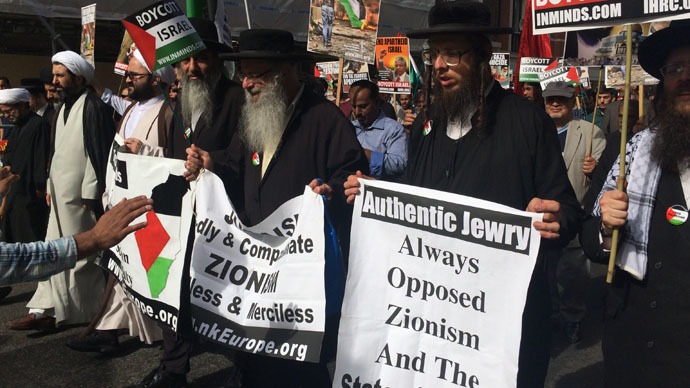A pro-Palestine campaigner has narrowly avoided being banned from practising his profession after the General Pharmaceutical Council (GPhC) decided that statements he had made against Zionists and Israel were not intended to be anti-Semitic.
The GPhC initiated disciplinary procedures against Nazim Ali in 2018 after a complaint by the Campaign Against Anti-Semitism (CAA) alleging that he had insulted Zionists, Zionist rabbis and those associated with the Jewish Board of Deputies at the annual Al-Quds day rally in London. The CAA’s primary purpose is to defend the state of Israel by stigmatising as anti-Semitic anyone who supports Palestine and opposes Zionism.
Since then the case had taken many turns and twists [see timeline (1) below] with Mr Ali even being exonerated at one point before the case was reopened following intense lobbying from pro-Israel activists.
The Fitness to Practice Committee of the GPhC has now found that of the four statements made by Ali during the 2018 Al-Quds Day Rally in London, two were objectively anti-Semitic.
At the demonstration, Mr Ali had accused Zionists of not being real Jews and chided them for their support of the Conservative Party which he held responsible for the 2017 Grenfell Tower inferno.
Although Mr Ali had gone to great lengths to distinguish between Zionism and Judaism during the rally, his comments attracted complaints from pro-Israel counter protestors.
The GPhC arrived at its determination on the basis that a normal person on the Clapham Omnibus would ordinarily deem the Mr Ali’s statements to be anti-Semitic. IHRC finds this methodology extremely worrying given the latitude it allows authorities to impute whatever views, knowledge and biases they wish to Joe Public.
On the Grefell Tower comment the panel held an ordinary member of the public would not have understood the syllogism used by Ali as “it was not at all clear if there was blame to be apportioned” for the disaster at the time he made his statement. This despite the fact that people were clearly blaming the government for the disaster within hours of the event. The panel’s equation of Zionism with Jews in this instance, contrary to all evidence showing otherwise, will have a chilling effect on free speech for regulated professionals.
Having determined against Mr Ali the GPhC accepted that his comments were not intended to be anti-Semitic, that he had not embarked upon a “deliberate diatribe of hatred”, the comments were “not indicative of an underlying attitudinal failing” and were made in the heat of a highly charged gathering where pro-Israel activists were referring to Muslims as paedophiles and terrorists. It issued Mr Ali with a warning.
IHRC is concerned that the disciplinary process displays a cowering of the courts and professional authorities to political lobby groups when considering issues concerning Palestine. This lack of pushback against vexatious claims by pro-Israel groups undermines equality.
Chair of IHRC, Massoud Shadjareh said: “While we are pleased that Mr Ali has not been struck off, this determination rings alarm bells about the galloping weaponisation of anti-Semitism that now increasingly seeks to target professionals for activities undertaken outside their work. It is cynically designed to cow pro-Palestine activists by making them vulnerable to disciplinary action simply for expressing legitimate political views.”
For more information or comment please contact the Press Office on (+44) 7958522196.
Notes to editors:
Timeline of the Nazim Ali case:
• In 2018 the Director of Public Prosecutions judged that the comments were anti-Zionist following a complaint from the pro-Israel group Campaign Against Anti-Semitism (CAA).
• His decision was affirmed by the High Court in December the same year which dismissed a challenge brought by the CAA.
• After the High Court decision, a GPhC caseworker reviewed the complaint made by the CAA and held that Mr Ali’s comments were not racist or ant-Semitic.
• Her decision was reviewed by two GPhC professional regulations managers and a GPhC regional manager, who all stated that the decision was correct.
• In December 2018 lawyers acting for Mr Ali were informed that the case was closed. However, in the summer of 2019, the GPhC reopened the case justifying its decision on the basis that it had to evaluate Mr Ali’s comments on the basis of the International Holocaust Remembrance Alliance definition of anti-Semitism. Like many organisations, the GPhC has never adopted the problematic definition.
• In November 2020, following a 10-day hearing it finally decided that Mr. Ali had not been anti-Semitic, pro-Israel organisations once again complained to the PSA which decided to refer the GPhC decision to the High Court. The GPhC concurred with the PSA and abandoned the decision of its own tribunal.







